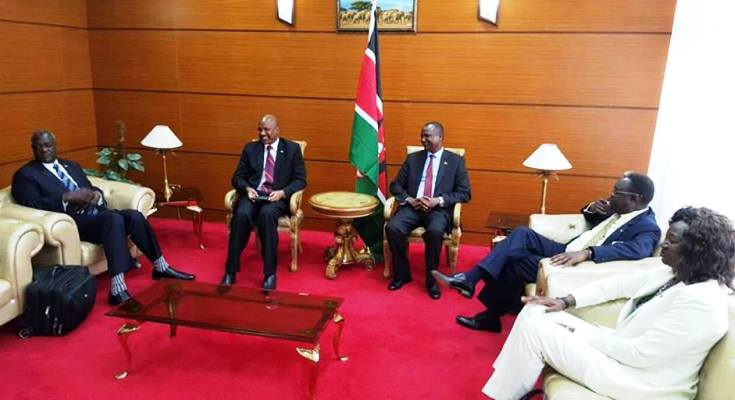Machar’s successor sets condition for stepping down as VP
August 20, 2016 (JUBA) – South Sudan’s newly appointed first vice president, Taban Deng Gai has conditioned stepping down from his position, asserting that his predecessor should first accept to cut down his security details before resuming office.

“We are moving forward. If Riek comes and he conditioned that for the country to have peace, that he must return to the palace we shall discuss that, including that Riek if you go back to your office this time, you don’t have huge army to move with you. This time you listen to the voices of the people that people of South Sudan will not need crisis any longer”, said Gai.
He reiterated that he would only step down if doing so would bring peace to the country.
“I am also telling you if my stepping down can bring peace to South Sudan I’m ready when time comes. But what I am doing now I am not delaying the implementation of peace waiting for anybody, I am to the task, I am capable of delivery. I managed to create harmony now in the presidency in the government of national unity”, he added.
He claimed that a faction of the SPLM-IO members who could not escape following the fighting that happened in July asked themselves whether to stick to peace or allow the country to return to war.
“I’m glad to inform you that the leadership of the SPLM in Opposition has decided to stick to the position of implementing peace, because the country has no option better than continuing with the implementation of the peace. The country needs peace,” said Gai.
The former rebel chief negotiator further explained that the peace agreement is good for the people of South Sudan and can take them out of crisis and move forward in the road of peace and reconciliation and bring about the development of the country. He claimed that what was lacking after formation of unity government was a cohesive leadership in the country, saying the presidency did not have a good working relationship.
“The council of ministers of the transitional government of national unity was also not cohesive. The former chairman of SPLA IO was leading a parallel government in Juba. There was nothing to be called a team, even you members of the press who were in Juba witnessed that the existence of parallel armies is what brought crisis that led to the killing in Juba and the former FVP moving away from Juba”, explained Gai.
He also said he did not follow Machar since the latter opted to fight another civil war.
“I and the leadership of SPLA IO decided to remain in Juba to implement peace”, added Gai.
(ST)
